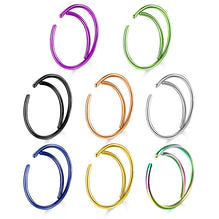
Aug 2022
0 Comments
Nose Piercing Care As You Heal
Looking to know more about nose piercing care? Now that you have made the decision to have your nose pierced, we want you to take the best possible care of your piercing as it heals.
The people who heal quickly and uneventfully are those who follow instructions for piercing care in the immediate days and weeks afterward, and we want you to be one of them.

Watch for Bacterial Infections
Whenever a person has any incision into his skin -whether it's a pinprick or a surgical incision- the opening in his skin presents a doorway for bacteria to enter the body. How will you know if you develop an infection, despite of your nose piercing care? There are specific symptoms to watch for:
Increased pain is one of the earliest symptoms, even before you can observe other symptoms.
Erythema, or redness of the skin around the piercing, is a telltale sign.
Discharge beyond the ordinary oozing is symptomatic, especially if it increases or thickens.
Discharge of uninfected piercings might be clear with a very slight tinge of blood. Infection has probably set in if it becomes green, gray, or yellow. You might even notice a foul odor.
The pierced area might begin to feel warmer than the surrounding skin. If you develop a fever, that's a certain indication.
If you think your piercing is becoming infected, do not remove the jewelry! You should immediately consult your physician or piercing professional. If you remove the jewelry without professional help, you run the risk of developing an abscess from pus that is unable to drain.
Nose Piercing Care and Cleaning Agents
Once you've had a piercing done, the first thing you should do whenever you are going to put your hands near it is-wash your hands! Use soap and water. And nobody but you should ever touch your piercing, at least until it's completely healed.
There are some antiseptic solutions that work well on many types of wounds and sores, but not on piercings. They break down the skin even as it's trying to grow new cells that will help you heal. Avoid alcohol, Betadine, hydrogen peroxide, chlorhexidine, methylated spirit, or tea tree oil. The interruption in the healing process can even lead to infection.
Instead, use a sterile saline solution or one with sea salts, applied with a gauze pad or cotton ball, to cleanse your piercing daily.
Risk of Keloid Scarring
Keloidal scars occur when the scar doesn't stop at the site of the piercing. Keloids are characterized by smooth, shiny, raised scars, and they don't go away. They are also itchy and painful.
There are also hypertrophic scars, which are shiny and raised, but they don't grow beyond the boundary of the piercing. Some hypertrophic scarring can be reduced by cortisone injections.
Give a great deal of thought before you have a helix piercing, because they are prone to keloid scar formation. A helix piercing is a horizontal piercing that affixes the jewelry with two holes. Using a piercing gun instead of a smaller needle is also not recommended.

We Recommend Lavender Oil as Prime Nose Piercing Care
Many people enjoy the use of lavender essential oil as nose piercing care and insist that it reduces scar tissue. It will lubricate your piercing and prevent its tightening.
First you must dilute it by blending 10 drops of lavender oil with 15 ml grape seed or sweet almond oil. Apply a drop to the piercing using a cotton ball or swab, remove excess oil, and then move the jewelry back and forth in the piercing.
Sleeping with a Piercing
Before you go to bed you should cover your piercing with a small piece of hypoallergenic tape, especially those in the alar position (the outer flare of the nostril). It's very easy to dislodge them while you're asleep.
Stop Smoking!
Smoking is bad for your piercing. It suppresses the immune system, which interferes with any kind of healing. Smokers report at least several months' extra healing time, especially for piercings through cartilage. If you can't stop smoking, then perhaps you should consider whether to have any piercings.
Swimming Precautions
If you enjoy swimming, go ahead and take a dip. You must, however, limit your time in a chlorinated or ozone-treated pool. If your favorite swimming place is the ocean or a natural waterway, avoid swimming after a heavy rain-storm water runoff contains bacteria and parasites that can cause problems.
Viral Infections
You are vulnerable to infections such as hepatitis A, B, and C as well as HIV while your piercing heals. Give it the same protection you would provide to any open wound by avoiding the body fluids of possibly infected persons, including blood, saliva, sweat, semen, and vaginal secretions. Nose piercing care is about maintaining essential hygiene as you would in any healing period.
Vitamins
You can promote wound healing by taking extra vitamin C (2000-3000mg daily) and zinc (100mg daily). Studies show that these extra doses will help you to heal more quickly, but you cannot get these doses in a regular multivitamin.
You'll find the right products at your local pharmacy or health food store. If you are taking any kind of prescription medication while your piercing heals, check with your doctor or pharmacist to be certain that these supplements will not interact with your medication. Vitamin C is believed to interfere with absorption of contraceptive pills, for example, if they are taken together.
Nose Piercing Care As You Heal...
Expect your nose piercing to heal completely only after six to twelve weeks. Look for quality stainless steel and gold jewelry for your piercing. Gold less than 14k is not recommended.

